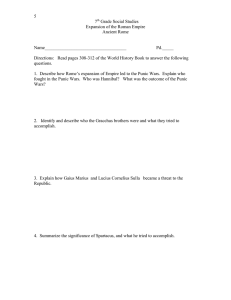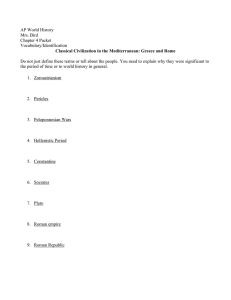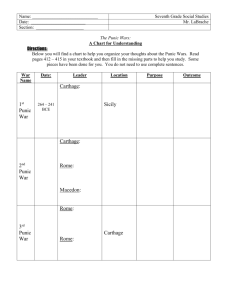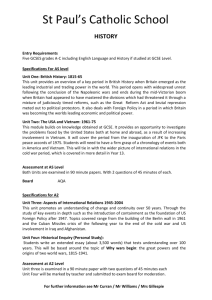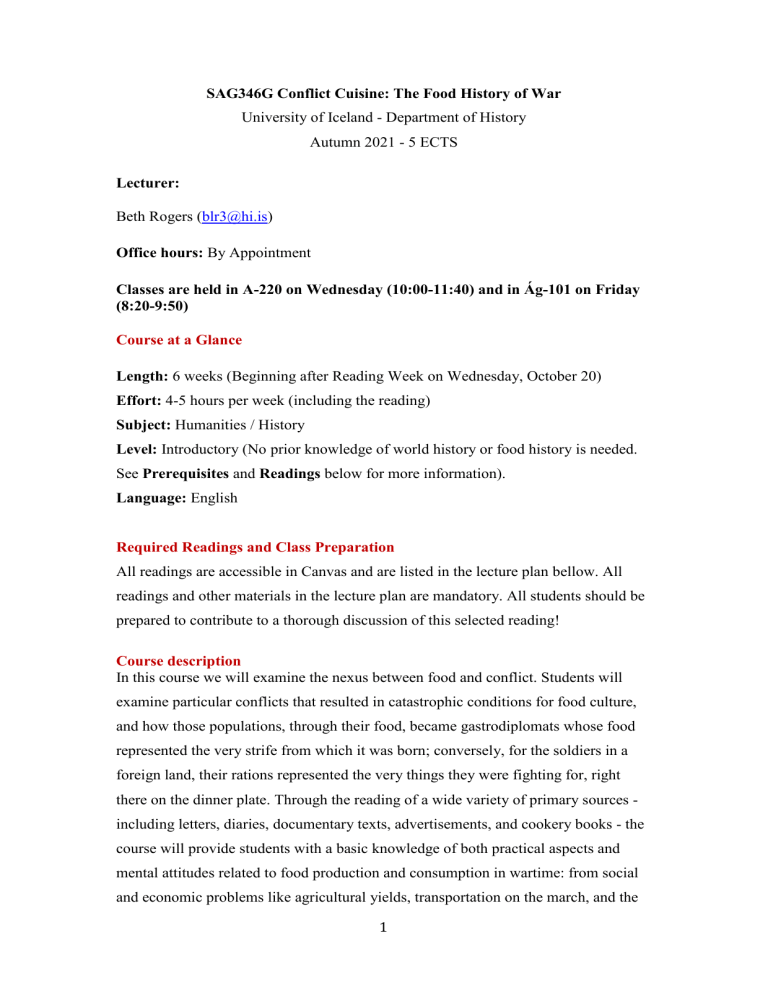
SAG346G Conflict Cuisine: The Food History of War University of Iceland - Department of History Autumn 2021 - 5 ECTS Lecturer: Beth Rogers (blr3@hi.is) Office hours: By Appointment Classes are held in A-220 on Wednesday (10:00-11:40) and in Ág-101 on Friday (8:20-9:50) Course at a Glance Length: 6 weeks (Beginning after Reading Week on Wednesday, October 20) Effort: 4-5 hours per week (including the reading) Subject: Humanities / History Level: Introductory (No prior knowledge of world history or food history is needed. See Prerequisites and Readings below for more information). Language: English Required Readings and Class Preparation All readings are accessible in Canvas and are listed in the lecture plan bellow. All readings and other materials in the lecture plan are mandatory. All students should be prepared to contribute to a thorough discussion of this selected reading! Course description In this course we will examine the nexus between food and conflict. Students will examine particular conflicts that resulted in catastrophic conditions for food culture, and how those populations, through their food, became gastrodiplomats whose food represented the very strife from which it was born; conversely, for the soldiers in a foreign land, their rations represented the very things they were fighting for, right there on the dinner plate. Through the reading of a wide variety of primary sources including letters, diaries, documentary texts, advertisements, and cookery books - the course will provide students with a basic knowledge of both practical aspects and mental attitudes related to food production and consumption in wartime: from social and economic problems like agricultural yields, transportation on the march, and the 1 analysis of the evolution of psychological approaches towards food, cooking and starvation; from Antiquity to the modern day. Week 1: An Army Marches on its Stomach: Soldier Rations Throughout Time Week 2: Food from Foreign Lands: The Crusades and the Punic Wars Week 3: Eating Across Egypt and Russia: The Napoleonic Wars Week 4: Rationing and Mock Apple Pie: First World War Week 5: Victory Gardens and Spam: Second World War Week 6: Phở and French Baguettes: Vietnam Learning Outcomes By the end of our course, students will be able to: ● Describe how food serves as a driver of conflict ● Discuss how food has served in the past as a tool to communicate a specific culture, time or place ● Identify how the cuisine of one’s homeland differs from the cuisine that is served outside of that place of origin a. What has been preserved or modified upon arrival in a new place? b. What changes have been made, if any, to accommodate recipes to different tastes and the availability of food supplies? ● Prepare a dish for the class of non-Icelandic origin, to be served at our Endof-Semester Potluck ● Create a 500-word analysis of the dish to describe its value, origin, importance to its home culture, and what accommodations you made for taste or availability of supplies here in Iceland. Grading There will be 3 graded assessment types in this course: 1. Participation. Attendance and making an effort in class will make up 20% of your final grade. All students are expected to come prepared for each session with a clear overview of selected class readings (see below). Students are expected to contribute to the in-class discussions. All lectures are obligatory, and attendance will be recorded at each session. There will also be smaller assignments (worksheets, review work, and 2 others) throughout the course which will fall under Participation. You are expected to complete them all. For example, one of these will be to use Flipgrid to introduce yourself and set a goal for yourself in this class (and at Háskóli Íslands for the year). 2. Class Notes. Students will add comments and ideas about each week’s readings to the Discussion Section of the class Canvas. This will count for 30% of your grade. The purpose of this exercise is to create a collaborative resource on food and military history. Different backgrounds, cultures and opinions can affect how individuals “receive” a text. Our class Discussion section on Canvas will serve as a place to formulate ideas and research, as well as demonstrate how texts can be received in different ways. For those unable to participate in the online class discussions, this will be a valuable resource. In each discussion, I may choose from these comments and ideas to dive deeper into that week’s topics. Write at least 500-800 words per week. The weekly reflection writing will be due on Friday of each week. 3. End-of-Semester Potluck. Working in pairs (or alone, if you prefer), this will be the most delicious final project of the year and will account for 50% of your grade. Students will prepare a dish of non-Icelandic origin for our class. The recipe will be accompanied by an 800-word analysis of the dish to describe its ingredients, uses, purpose, origins, and importance to its home culture, and any accommodations you made for taste or availability of supplies here in Iceland. You will also present this information verbally to the class as you invite them to try your dish. Students may ask questions, as well. ** If you have food allergies, please let the class know as soon as possible! To find a recipe, take a look at: The Sifter: A Tool for Food History Research On November 12, e-mail Beth your choice of recipe for approval Week 1 – October 20 & 22, 2020 An Army Marches on its Stomach: Soldier Rations Throughout Time Wednesday, October 20: Knowledge is Power! … But so is Food! (The Introduction) ● Scholliers, P. (2012). The Many Rooms in the House: Research on Past Foodways in Modern Europe. Writing Food History. A Global Perspective (Eds: K. Claflin & P. Scholliers). 3 ● Fischler, C. (1988). "Food, Self and Identity." Social Science Information 27: 275-293. ● Stelzer, C. (2012). Dinner with Churchill: Policy Making at the Dinner Table. New York and London, Pegasus Books: Chapter 3 “Christmas at the Whitehouse, December 1941-Janaury 1942. ● Rockower, P. (2012). “Recipes for gastrodiplomacy.” Place Brand Public Dipl 8, 235–246. https://doi.org/10.1057/pb.2012.17 Friday, October 22: Forward March! ● Gastropod podcast episode, “Marching on our Stomachs: The Science and History of Feeding the Troops” (March 27, 2018) ● What Did Soldiers Eat? (YouTube video from Simple History) ● Food Republic [online]. (2012).“A brief history of food and war.” (Bonus Iceland mention) ● Rogers, B. (2018). “Swedening the Deal: Food, Famine and Power in the Great Northern War.” Published Proceedings of the Dublin Gastronomy Symposium (May 29–30, 2018). ● Grinspan, J. (2014).“How Coffee Fueled the Civil War.” New York Times Opinionator [online]. ● Feeding a Roman Legion – Tasting History with Max Miller Week 2 – October 27 & 29, 2020 Food from Foreign Lands: The Crusades and the Punic Wars Wednesday, October 27: The Crusades ● Krondl, M. (2008). "First Taste: St. Albans." In The Taste of Conquest: The Rise and Fall of the Three Great Cities of Spice. ● The Crusades: Pilgrimage or Holy War? (Crash Course History #15) ● How do Arabic Nations Teach the Crusades? (Today I Found Out) ● The Geography of Spices and Herbs (Atlas Pro)Tyerman, C. (2019). "Food and Drink." In The World of the Crusades: An Illustrated History. New Haven and London: Yale University Press. ● What the Average Medieval Diet is Like (Weird History) Friday, October 29: The Punic Wars 4 ● Erdkamp, P. (2011). “Manpower and Food Supply in the First and Second Punic Wars” (pp. 58–76). In A Companion to the Punic Wars. Edited by Dexter Hoyos. ● Making an Ancient Roman Cheesecake – Tasting History with Max Miller ● The Punic Wars (Part 1) – Extra History ● The Punic Wars (Part 2) – Extra History ● The Punic Wars (Part 3) – Extra History ● The Punic Wars (Part 4) – Extra History ● Weirdest Food from Ancient Rome – Weird History Week 3 – November 3 & 5, 2020 Eating Across Egypt and Russia: The Napoleonic Wars Wednesday, November 3 ● 18th Century Soldier's Rations – (Townsends) ● "A Pound of Meat" Soldier Food in the 18th Century – (Townsends) ● Bohstedt, J. (2010). “'We'd Rather be Hanged than Starved!': The Politics of Provisions” and “The Genesis of Provision Politics, 1580-1650.” In The Politics of Provisions: Food Riots, Moral Economy and Market Transition in England, c. 1550-1850. Surrey, England: Ashgate Publishing Ltd. Friday, November 5 ● O’Rourke, Kevin H. (2006). “The worldwide economic impact of the French Revolutionary and Napoleonic Wars, 1793–1815.” Journal of Global History, 1(1), 123–149. ● Oddy, D. J. (1970). Food in nineteenth century England: Nutrition in the first Urban Society. Proceedings of the Nutrition Society, 29(1), 150–157. Week 4 – November 10 & 12, 2020 Rationing and Mock Apple Pie: First World War Wednesday, November 10 ● Bell, D. M. and Moran, T. (2020). "Italian Soldiers in WWI and the Emergence of a National Culinary Identity. Published Proceedings of the Dublin Gastronomy Symposium (May 26-27, 2020). 5 ● Tunc, T. E. (2012). "Less Sugar, More Warships: Food as American Propaganda in the First World War." War in History 19(2): 193-216. Friday, November 12 Week 5 – November 17 & 19, 2020 Victory Gardens and Spam: Second World War Wednesday, November 17 ● Weird Food People Ate to Get Through the Great Depression - (Weird History) ● The Supersizers Go … Wartime (Part 1) ● The Supersizers Go … Wartime (Part 2) ● Rationing in Britain (1940-1954) (Various video clips) ● Gastropod podcast episode, “Dig for Victory” (June 16, 2020) Friday, November 19 ● Rationing and Recycling – Excerpt from Ken Burns’ documentary The War Week 6 – November 24 & 26, 2020 Phở and French Baguettes: Vietnam ● Uong, M. (2015, December 15). “How I Escaped Vietnam.” New York Times. Travel section [online edition]. ● Andrea Nguyen. Into the Vietnamese Kitchen (Berkeley: Ten Speed Press, 2006). “Introduction” and “The Roots of Vietnamese Cooking.” ● Food in Every Country (2016). Vietnam. Food by Country.com Resource Page. ● Cold War Ideology – Excerpt from Ken Burns’ documentary The Vietnam War ● Press Coverage of Vietnam – Excerpt from Ken Burns’ documentary The Vietnam War 6 ● Chapple-Sokol, S. (2013). “Culinary Diplomacy: Breaking Bread to Win Hearts and Minds.” The Hague Journal of Diplomacy, 8(2), 161-183. December 2 – 16, 2021: Final Exam Period Our End-of-Semester Potluck will occur during Finals Week Time and Date To Be Announced Other Matters Academic Integrity (Don‘t Plagiarise, It‘s Bad) The University of Iceland expects all students to maintain academic integrity in their work. The university will take appropriate corrective action in response to any violations, which may include dismissal from the course or from the university; revocation of any certificates received for the university course; or other remedies as circumstances warrant. Nondiscrimination / Anti-Harassment University of Iceland is committed to maintaining a safe and healthy educational and work environment in which no member of the community is excluded from participation in, denied the benefits of, or subjected to discrimination or harassment in, our program. If you have any questions or concerns, please report your experience to the Equality Opportunities Officer of the University of Iceland. You can e-mail jafnretti@hi.is for further or help. so that you may spend Reading Week getting into your topic. Students are also encouraged to contact the instructor at any time in order to ask for suggestions and help regarding the topic and the draft of their papers. 7
